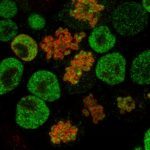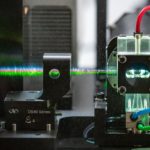Link to Pubmed [PMID] – 24115267
Stem Cells 2014 Feb;32(2):377-90
Random epigenetic silencing of the X-chromosome in somatic tissues of female mammals equalizes the dosage of X-linked genes between the sexes. Unlike this form of X-inactivation that is essentially irreversible, the imprinted inactivation of the paternal X, which characterizes mouse extra-embryonic tissues, appears highly unstable in the trophoblast giant cells of the placenta. Here, we wished to determine whether such instability is already present in placental progenitor cells prior to differentiation toward lineage-specific cell types. To this end, we analyzed the behavior of a GFP transgene on the paternal X both in vivo and in trophoblast stem (TS) cells derived from the trophectoderm of XX(GFP) blastocysts. Using single-cell studies, we show that not only the GFP transgene but also a large number of endogenous genes on the paternal X are subject to orchestrated cycles of reactivation/de novo inactivation in placental progenitor cells. This reversal of silencing is associated with local losses of histone H3 lysine 27 trimethylation extending over several adjacent genes and with the topological relocation of the hypomethylated loci outside of the nuclear compartment of the inactive X. The “reactivated” state is maintained through several cell divisions. Our study suggests that this type of “metastable epigenetic” states may underlie the plasticity of TS cells and predispose specific genes to relaxed regulation in specific subtypes of placental cells.





